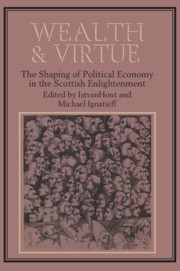Book contents
- Frontmatter
- Contents
- Preface
- List of abbreviations
- 1 Needs and justice in the Wealth of Nations: an introductory essay
- 2 Where had the Scottish economy got to by the third quarter of the eighteenth century?
- 3 Gershom Carmichael and the natural jurisprudence tradition in eighteenth-century Scotland
- 4 The Scottish professoriate and the polite academy, 1720–46
- 5 From applied theology to social analysis: the break between John Locke and the Scottish Enlightenment
- 6 The Scottish Enlightenment at the limits of the civic tradition
- 7 Adam Smith as civic moralist
- 8 The legal needs of a commercial society: the jurisprudence of Lord Kames
- 9 Cambridge paradigms and Scotch philosophers: a study of the relations between the civic humanist and the civil jurisprudential interpretation of eighteenth-century social thought
- 10 Adam Smith's ‘enduring particular result’: a political and cosmopolitan perspective
- 11 The ‘rich country–poor country’ debate in Scottish classical political economy
- 12 John Millar and individualism
- 13 Scottish echoes in eighteenth-century Italy
- Index
5 - From applied theology to social analysis: the break between John Locke and the Scottish Enlightenment
Published online by Cambridge University Press: 05 June 2012
- Frontmatter
- Contents
- Preface
- List of abbreviations
- 1 Needs and justice in the Wealth of Nations: an introductory essay
- 2 Where had the Scottish economy got to by the third quarter of the eighteenth century?
- 3 Gershom Carmichael and the natural jurisprudence tradition in eighteenth-century Scotland
- 4 The Scottish professoriate and the polite academy, 1720–46
- 5 From applied theology to social analysis: the break between John Locke and the Scottish Enlightenment
- 6 The Scottish Enlightenment at the limits of the civic tradition
- 7 Adam Smith as civic moralist
- 8 The legal needs of a commercial society: the jurisprudence of Lord Kames
- 9 Cambridge paradigms and Scotch philosophers: a study of the relations between the civic humanist and the civil jurisprudential interpretation of eighteenth-century social thought
- 10 Adam Smith's ‘enduring particular result’: a political and cosmopolitan perspective
- 11 The ‘rich country–poor country’ debate in Scottish classical political economy
- 12 John Millar and individualism
- 13 Scottish echoes in eighteenth-century Italy
- Index
Summary
The duty of mankind, as God's creatures, to obey their divine creator was the central axiom of John Locke's thought. The entire framework of his thinking was ‘theocentric’ and the key commitment of his intellectual life as a whole was the epistemological vindication of this framework. It is still a controversial question precisely what the religious opinions of David Hume and Adam Smith in fact were. But it would certainly be a profoundly implausible claim to make in relation to either that the framework of their thinking was in any sense ‘theocentric’. Whether or not either was in any theoretical sense an atheist, it is fair to describe each as being, as David Gauthier terms Hobbes, ‘a practical atheist’: someone for whom, if God does exist, at least his existence makes no practical difference to the sane conduct of human life. It is scarcely surprising that the acquaintance of a practical atheist like Hume should have troubled the neurotic and credulous James Boswell, whose conduct even when Hume was virtually on his deathbed fully merited the latter's lapidary rebuke on an earlier occasion that ‘it required great goodness of disposition to withstand the baleful effects of Christianity’. But it is historically more striking and more illuminating to notice that their (on the whole very discreet) practical atheism would certainly in Locke's eyes have put Hume and perhaps even a wholly honest Smith, at least in later life, beyond the pale of toleration: ‘Promises, covenants, and oaths, which are the bond of human society, can have no hold upon or sanctity for an atheist; for the taking away of God, even only in thought, dissolves all.’
- Type
- Chapter
- Information
- Wealth and VirtueThe Shaping of Political Economy in the Scottish Enlightenment, pp. 119 - 136Publisher: Cambridge University PressPrint publication year: 1983
- 20
- Cited by



